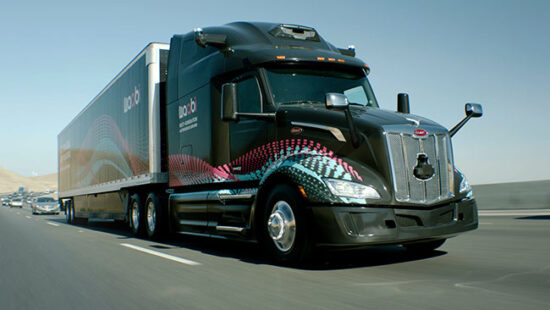Please welcome back Tarina Hawkins. This is her third posting here at the 21st Century Tech Blog. Tarina loves doing research and writing on a variety of topics. She prides herself in taking complex subjects and making them easy to understand. When not writing, she enjoys being outdoors in summer weather. Her topic today is the launch of a new generative AI system called Waabi Driver for use in long-haul trucks.
A Toronto-based startup, Waabi, plans to release the Waabi Driver, a generative artificial intelligence (AI) autonomous vehicle solution to revolutionize long-haul trucking. This onboard technology uses a generative AI model to gather and analyze vehicle sensor data and make predictive decisions in real-time. Unlike current platforms from other vendors, the Waabi Driver is being empowered to think and work in human terms enabled by a simulator called Waabi World. Thus the Waabi Driver can handle endless new road conditions like a human driver. How good is this technology? Big-name investors like Uber, Khosla Ventures, Porsche Automobil Holding SE, and Volvo Group Venture Capital have been putting money into the company with Waabi’s Level-4 trucks expected to begin rolling out in Texas on the high-traffic, commercial Interstate 45 corridor between Dallas and Houston beginning in 2025.
The Differentiator: Driving Autonomy In A Closed Loop System
Waabi Driver combines two generative AI models to improve road safety and accuracy. It is about creating an AI that thinks and learns like a human. Waabi Driver’s advanced generative AI simulator, Waabi World is the teacher for Waabi Driver trucks outfitted with radar, cameras, lidar and many other sensors. Compared to Waymo, Argo AI, Google and Tesla technology, the Waabi autonomous truck solution involves far less human intervention and testing.
Waabi World builds a digital twin of the real world automatically and at scale. It is unlike traditional simulators because AI is used to construct the geometry, appearance and material properties of real-world objects at scale and with the diversity and realism of the actual world. Using this digital world it creates scenarios to train Waabi Driver to reason like a human and learn from mistakes.
Waabi World’s simulation allows Waabi Driver to perform near real-time, high-fidelity sensor-based virtual simulations that mirror real-world perception. Its algorithms set Waabi Driver apart from attempts to build standard autonomous technologies as previously described on this blog site.
Endless Driving Scenarios Handled
“The Waabi Driver has the remarkable ability to generalize,” states Waabi founder and CEO, Raquel Urtasun. “So rather than trying to train a system on every single possible data point that has ever or could ever exist, the system can learn from a few examples and handle the unknown in a safe manner.”
Waabi has combined deep learning, probabilistic inference, and complex optimization to give its autonomous systems complex reasoning, an ability to apply learned skills to unseen scenarios and geographies, and the means to interpret, validate and verify its decisions. Urtisan notes that autonomous systems like Google and Tesla use machine learning and countless rule-based examples to try and cover all circumstances, objects, road conditions and weather. That means having to train for every contingency.
The Waabi World digital twin is Waabi’s game-changer altering the autonomous driving paradigm. With its ability to create common, unpredictable and critical scenarios, Waabi Driver can use its complex AI decision-making skills to learn and rapidly adapt. When a Waabi Driver faces a previously unknown situation it understands the potential impact of its actions and can make correct responses. It thinks about the maneuvers and outcomes in real time and chooses the correct actions.
In a Fortune Magazine interview, an unnamed Waabi spokesperson describes what sets Waabi apart from any other autonomous driving system.
“The best way I can describe it is to think about a car with a tree tied to the top of its roof. Other autonomous vehicles will see this as a tree in the middle of the road and try to avoid it while Waabi’s technology allows for its vehicles to interpret the situation and realize that the tree isn’t in the road, but in fact, on top of another car, and the truck can proceed as normal.”
A Technology To Transform Long-Haul Trucking
Urtusan describes the “exceptional ability to generalize” as the key differentiator of the Waabi ecosystem. “It’s very flexible, and it’s very fast to develop and it’s something that we can expand to do much more than trucking in the future. This could be robotaxis. This could be humanoids or warehouse robotics. This technology can solve any of those use cases.”
For now, however, the Waabi Driver is to be installed in long-haul trucks to answer the needs of an industry that is short of personnel. The U.S. needs to find 80,000 truck drivers to meet current demand and this number is expected to increase to 160,000 by 2030. The reasons for the trucker shortage are multifaceted. One of the keys is the high annual staff turnover rate of 97%.
Once the Waabi Driver rolls out, however, the demand for new drivers will lessen, and long-haul trucking will increasingly become autonomous. Investors agree with the company recently closing a US $200 million round, a testament to the technology’s recognized potential.
Where other autonomous truck companies like Embark Trucks and TuSimple have shut down operations, and Waymo recently ended its self-driving truck program, the Waabi ecosystem is not only seen as providing the missing answers but also as a less expensive solution which Urtusan says will “enable faster, safer and more scalable deployment of this transformative technology around the world.” After Waabi Driver gets rolling in Texas, plans will be put in motion to expand into other parts of the U.S. and Canada.









